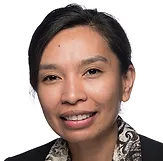
JO ANN MARTINEZ – U.S. AIR FORCE
Jo Ann Martinez has dedicated her time to advocating for women veterans ever since she separated from the Air Force in 2002. She served as Chair and member on DAV’s National Interim Women Veterans Committee for three years and has chaired the Department of California’s Legislative and Veterans’ Rights Committee.
Advocating to improve patient and family-centered care, Martinez joined the VA Palo Alto Health Care System’s Veterans and Family Advisory Council in 2013 and continues to serves as co-chair and on various other committees focused on improving the lives of America’s women veterans and their families.
“Although VA has taken steps to try and improve it their healthcare system for women veterans, there’s still a long way to go,” said Martinez. “The influx of women veterans utilizing the VA healthcare system—really designed for men—has increased significantly over the last ten years or so.”
When Martinez first started using the VA for her own healthcare in 2002, she said she was never addressed as a veteran, that it was assumed she was a nurse or dependent. That culture, she said, is still an issue across the country.
“To this day, I run into a lot of the same problems,” Martinez said. “I’ve be called ‘sir’, I’ve had to wait 30 minutes past my appointment time because they didn’t realize I was the veteran in the room waiting.”
Martinez said, despite the women veterans awareness campaigns the VA has pushed in recent years, many women veterans still feel like the culture in the military and VA keeps women from identifying as veterans.
“With the Interim Women Veterans Committee, what we did was have focus groups, and that was one of the main things that kept popping up,” she said. “It basically comes down to military cultural awareness and women veterans, how they serve, and some of the unique needs that we have. They’re not being recognized.”
Advocacy, said Martinez, is a certain way women veterans can make their voices heard.
“It’s important to have a seat at the table, we have all these complaints, but there’s a way to act,” she said. “We have to think about what our solutions are. What’s important about women veterans being active, is that you’re not just complaining, you’re being part of the solution. You’re actually putting your voice in and talking about the issues.”
